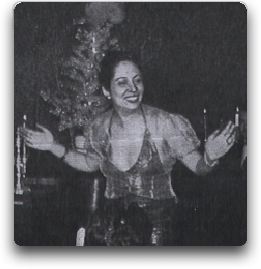gullcity@comcast.net | Gull City | Gull City Press | Fake Giraffe Records | Fake Giraffe MySpace
Saturday, December 23, 2006
A feminilidade do canto notes (I)
A slow crawl through the 2003 booklet on Elsie Houston (I won't dignify what I'm doing with the word "translation," dependent on English/Spanish cognates and babel fish as it is) reveals a great deal previously unknown here and fills in some important holes. I can now update the chronology, for example, though there are still gaps in what anyone knows about her life in Europe in the 1930s.
Some initial notes:
Cause of suicide: The book speculates (agreeing with NY Herald Tribune account) that her suicide was rooted in financial problems and declining career prospects related to the war, as well as a recent split from her Belgian baron patron. But it also suggests that life in New York was hard for a Brazilian, particularly one of mixed blood, so a bit of culture shock can be added to the mix of factors.
She was already a nightclub singer in Paris in the late 1920s. She met Péret through her sister and brother-in-law (who were acquainted, no doubt, because of a shared interest in Trotsky). When she returned to Brazil between 1929 and 1931, she was a concert singer (not the the pop star I'd thought). In fact, her repertoire was pretty much fixed over the last fifteen years of her life, with some exceptions. In Brazil, she included African-american folksongs in her program; In America, the macumba songs took center stage.
Péret and Houston alienated a lot of old friends in Brazil. Péret was rude, and Houston "a liberated woman." Apparently the couple did something so sacriligeus in front of Manuel Bandeira that he broke off his friendship (he and Houston later reconciled).
More to come...
(2) comments
Some initial notes:
Cause of suicide: The book speculates (agreeing with NY Herald Tribune account) that her suicide was rooted in financial problems and declining career prospects related to the war, as well as a recent split from her Belgian baron patron. But it also suggests that life in New York was hard for a Brazilian, particularly one of mixed blood, so a bit of culture shock can be added to the mix of factors.
She was already a nightclub singer in Paris in the late 1920s. She met Péret through her sister and brother-in-law (who were acquainted, no doubt, because of a shared interest in Trotsky). When she returned to Brazil between 1929 and 1931, she was a concert singer (not the the pop star I'd thought). In fact, her repertoire was pretty much fixed over the last fifteen years of her life, with some exceptions. In Brazil, she included African-american folksongs in her program; In America, the macumba songs took center stage.
Péret and Houston alienated a lot of old friends in Brazil. Péret was rude, and Houston "a liberated woman." Apparently the couple did something so sacriligeus in front of Manuel Bandeira that he broke off his friendship (he and Houston later reconciled).
More to come...
Thursday, December 21, 2006
Elsie Houston-A feminilidade do canto
I finally was able to get a copy of the Brazilian Elsie Houston CD/book. I am used to finding tiny fragments of information about EH. Now I am awash with information. Of course it is in Portuguese, so I'm painstakingly navigating my way through (which keeps the potential torrent to a trickle). More information to come (through agreement with interlibrary loan, I am not permitted to share photos/songs).
(0) comments
Sunday, December 17, 2006
EH profile in New York World-Telegram
(0) commentsWednesday, December 13, 2006
EH in Stage Magazine

Here's a photo from a brief story on Le Ruban Bleu, in the April 15, 1939 issue of Stage Magazine.
"Elsie Houston is the piece de least resistance, with her Brazilian songs."

